We Answered The Top 11 Questions About Mobile Chicken Coops
There's profit to be made in raising chickens on pasture.
But unfortunately, if things aren't done correctly, there's money to be lost as well.
At The Mobile Chicken House we've been manufacturing mobile chicken coops for years and today, we are applying our knowledge so you can get your questions answered, run your operation the right way, and stay profitable.
Let's get started!
(Feel free to read through the whole article or click on the question you are most interested in to jump straight there).
Table of Contents
If you are new to the idea of mobile chicken coops, you probably have some questions. We are about to cover some of the most commonly asked questions about our coops, so stay tuned!
Here is question #1.
1. What are chicken houses used for?
With all the fuss about free-range chickens, you may wonder if your chickens even need a coop. Is a coop unnecessary or even cruel?
Well, keeping your chickens enclosed in a shed or coop all the time is usually ill-advised. However, letting your chickens run wild with no shelter or protection is not a good idea either.
Chickens need shelter to protect them from the elements and predators. They also need a place to roost and a secure spot to lay their eggs.
So a chicken house serves these purposes:
- Provides shelter and protection for your hens
- Provides a safe spot for hens to lay eggs (where you can find them!)
- Provides a place for chickens to roost.
2. What is the point of a chicken tractor?
The idea of a chicken tractor comes from the concept of “regenerative agriculture.”
Regenerative agriculture means farming in harmony with nature and implementing systems that restore the land instead of depleting it. Chicken tractors can help achieve this.
When chickens roam free, they benefit the soil with their manure and scratching. However, if they are enclosed on one piece of ground for too long, they begin to wear the soil out and harm it instead of benefiting it.
A chicken tractor is a movable chicken coop that allows you to move your chickens around on pasture. That way, the soil can benefit from their activity, and they can benefit from the soil by eating plants and bugs. It is called a chicken tractor because the chicken’s scratching mimics the effect of tilling the soil on a tiny scale.
That is how a chicken tractor can help your farm!
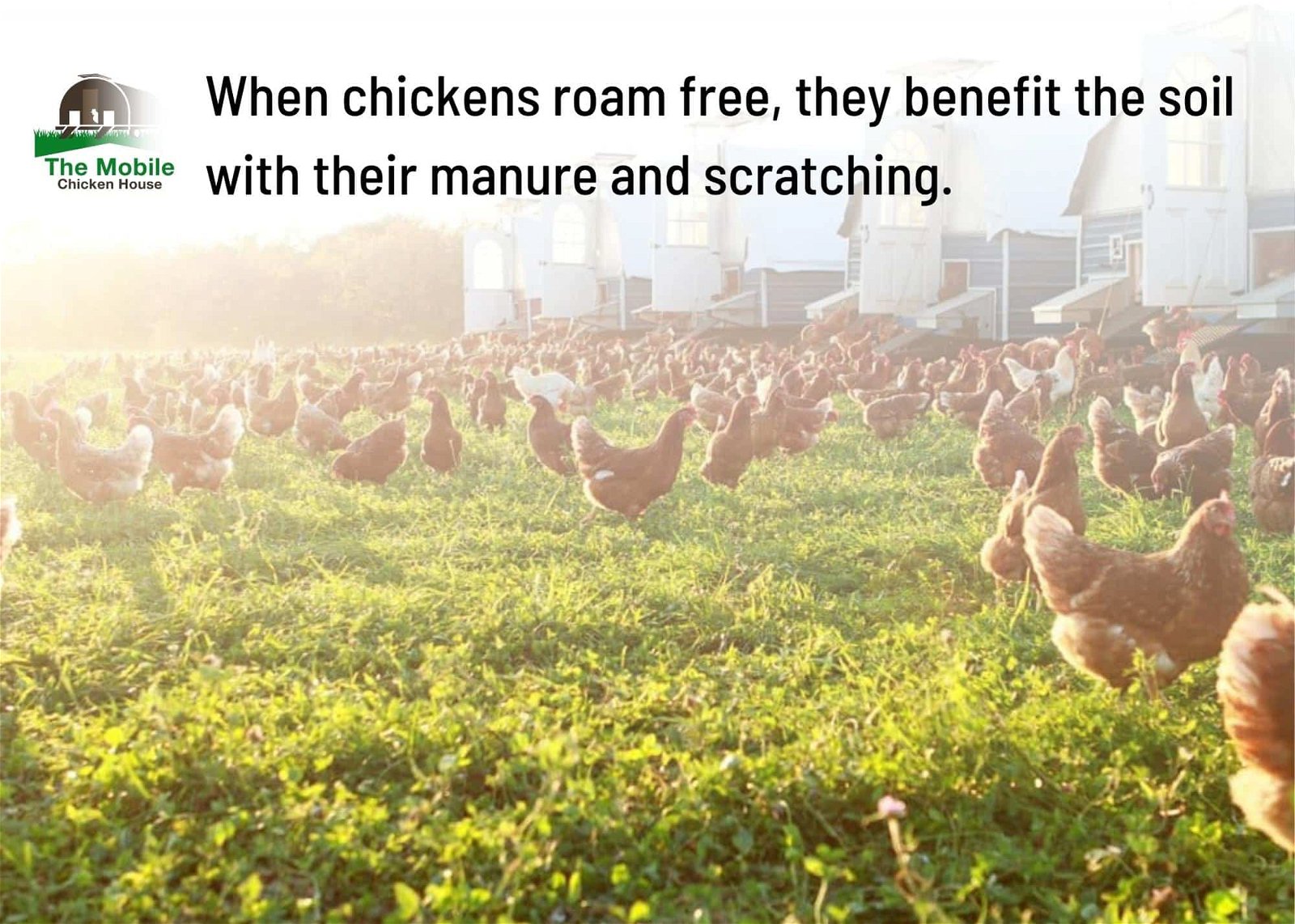
3. How many acres do you need to operate a chicken tractor?
How much land you need depends on how many birds you have. If you pack too many birds onto too little land, the nitrogen in the chicken manure will build up in the soil and harm it.
In his book, Poultry Breeding and Management, Professor James Dryden of Oregon Agriculture concludes that the golden ratio is 50 chickens per acre.
It is possible to pasture more than 50 chickens on one acre of land. Some intensive free-range chicken operations pasture up to 500 birds on one acre. However, these operations have careful systems for dealing with excess nitrogen.
At The Mobile Chicken House, we recommend operating our mobile chicken coops on 3-5 acres of land, depending on the size of your coop.
4. How often should I move my chicken tractor?
If you leave your chicken tractor in one place for too long, you may see obvious piles of chicken droppings or bare patches of ground. Those are signs that you need to move your coop.
We recommend you move your chicken tractor every 1-3 days. The size of your foraging area and the number of birds you have come into play when deciding how often to move your coop.
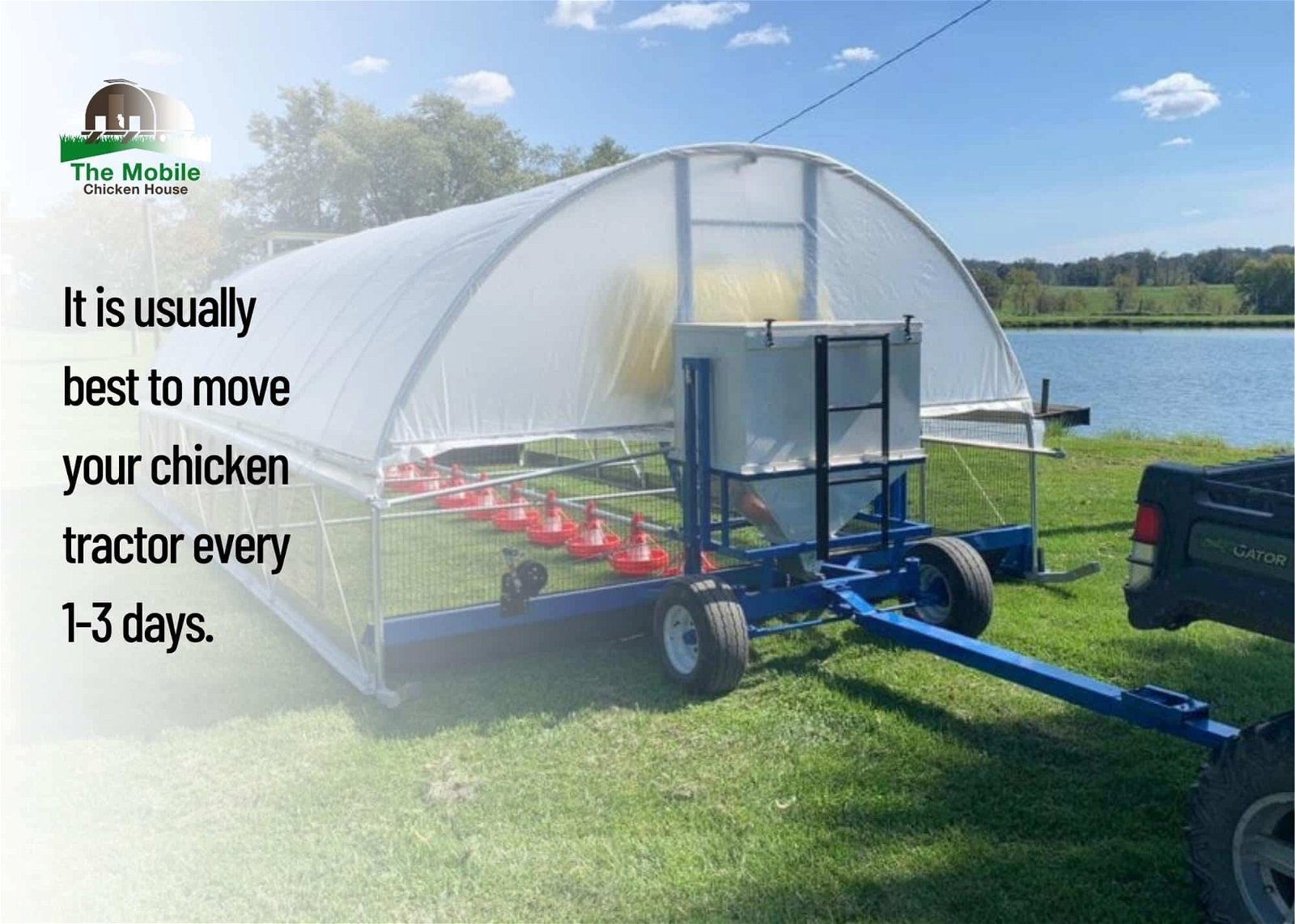
5. How many nesting boxes does a chicken need?
If you want your birds to lay in a regular spot where you can find the eggs (and not in a far corner of the barn or the weeds), you need to provide them with an inviting nesting spot.
You will need plenty of boxes, but you don’t need one per chicken. A good rule of thumb is to have one box for every 4-6 chickens.
If you are having trouble getting your birds to nest in the boxes, try placing plastic eggs or golf balls in them to simulate eggs. Chickens are more likely to add eggs to an existing clutch than to start a new one, so the golf balls may encourage them to lay in the boxes. Once the chickens have accepted the boxes as a safe and secure spot, they will probably return on their own.
FUN FACT: Chickens seem to like sharing the same nesting boxes. You may see two chickens scrunched into the same box at the same time, and even if there are enough boxes for one per chicken, they tend to all lay in the same several boxes. They are super good at sharing the space!
6. How much space do chickens need?
How much space a chicken needs depends on how “free range” it really is. A chicken that truly has unlimited access to the outdoors and spends most of its time outside the coop does not need nearly as much coop space as a chicken that spends most of its time inside a coop.
We design our Mobile Chicken House coops to provide feed, water, egg-laying space, and nighttime protection for your flock. The rest of the time, the birds are outside.
Each Mobile Chicken House is rated on the number of birds it can accommodate. Some farmers have successfully kept more chickens per coop than our ratings, but we prescribe keeping it to the recommended numbers for the best results.
7. Why are chicken houses off the ground?
You may have noticed that many chicken houses, including our Mobile Chicken Houses, are built with a generous space beneath them.
Here are a few reasons why you would want to build your chicken coop off the ground:
- A space between the ground and your chickens protects them from burrowing predators like snakes and pests like rodents.
- A space beneath your floor allows for better ventilation in your coop, resulting in lower moisture levels.
- It extends the life of your coop floor.
- If your chickens can walk beneath your coop, it adds usable space to your chicken run. It also provides shade for your chickens.
- Your chickens can shelter from weather and aerial predators under your coop as well as in it.
Both our models of mobile houses for laying hens have a good clearance beneath them. The floors inside are slotted to allow the chicken droppings to fall through and keep the coop cleaner.
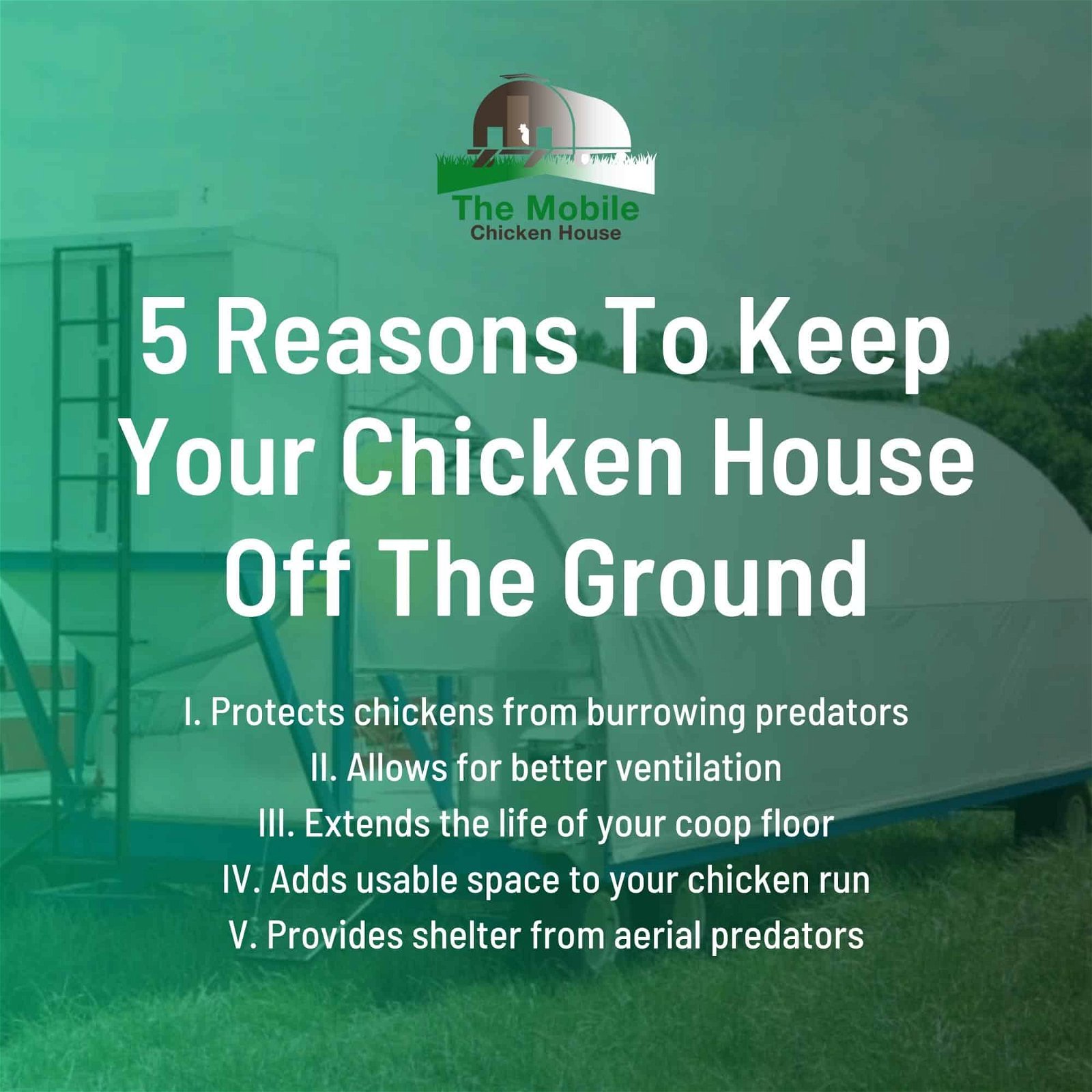
8. Should chicken coops be in the sun or the shade?
Chickens need plenty of sunshine to be productive layers. Sunshine stimulates the egg-laying process and helps chickens absorb calcium, which is essential for forming egg shells.
Sunlight also stimulates activity, and active chickens are the healthiest. Because of this, some farmers install lights in their chicken coops to increase activity and thereby increase egg production.
However, while sunlight is good for chickens, they tend to overheat easily, so on hot days they need plenty of fluids and access to shade.
With mobile chicken coops and free-range chickens, whether you place your coop in the sun or the shade doesn’t make a huge difference as long as your chickens have access to cool, shady areas.
We recommend placing your chicken coop in a spot where your birds have access to both sun and shade and letting them take care of themselves.
If your coop has space beneath it, your chickens can always take refuge underneath the coop if they need shade.
9. What is the best style of mobile chicken coop?
It’s hard to say what style of mobile chicken coop is the absolute best because that depends on your situation and needs.
But here are a few features we think it’s useful to have in a mobile chicken coop:
- An automatic feeding system that cuts down on wasted food
- Easy movability
- Solar power
- A custom egg gathering system to save you work
- An automatic watering system
- Quality, heavy-duty construction
At the Mobile Chicken House, we have several styles and sizes of mobile coops, from large egg-production coops to house 650 chickens to small, backyard movable coops.
Check them all out today on our website!
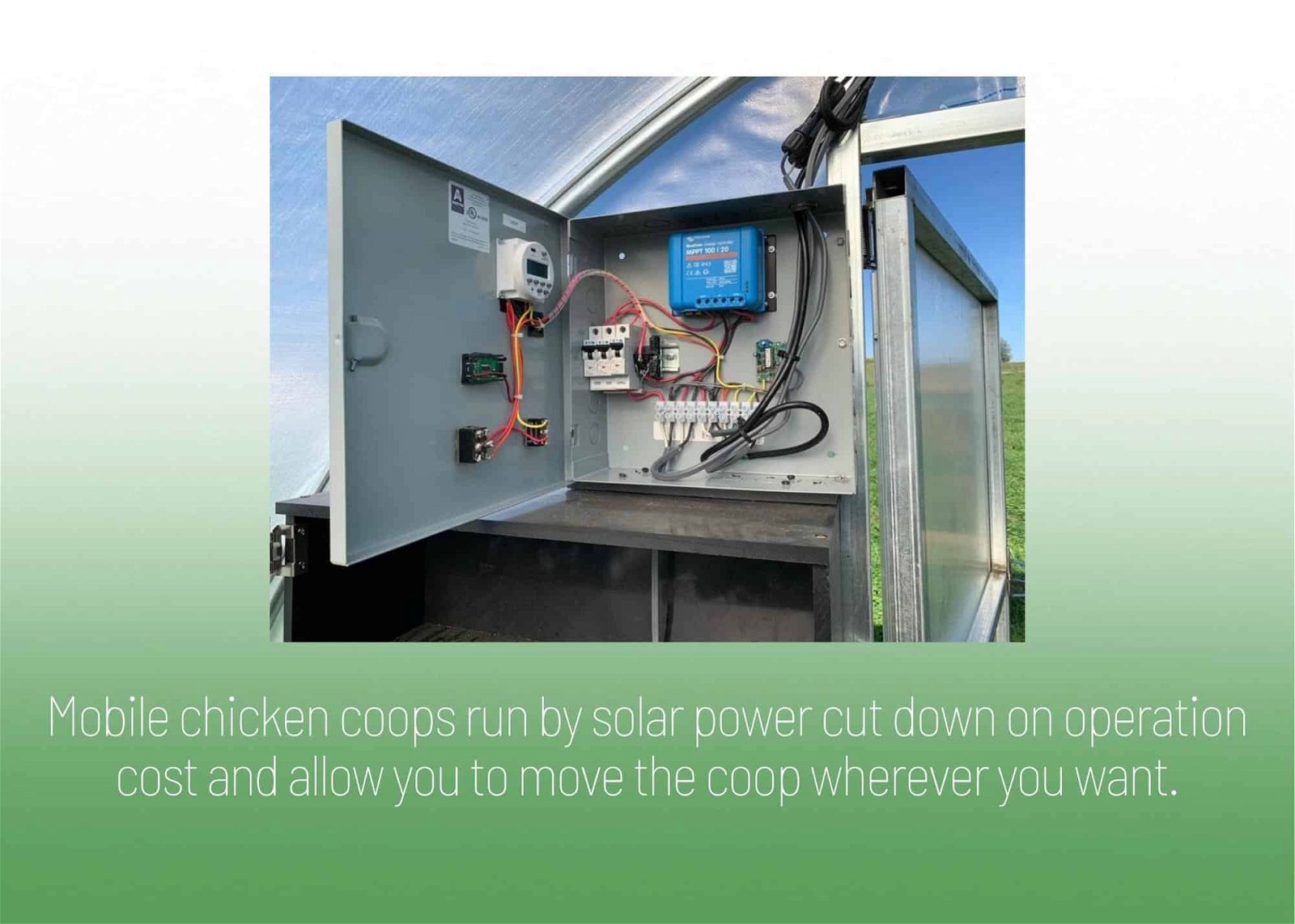
10. Can chickens be kept in a coop all day?
Provided you have a large, roomy coop with plenty of light, it’s possible to keep your chickens inside all the time. Keeping your birds inside ensures their safety from predators and provides them warmth and shelter.
However, we don’t recommend keeping your chickens inside all the time. Chickens were made to roam around and forage for themselves, and it’s good for their bodies and minds when they are allowed to do what chickens do. They were not made to be cramped together in commercial chicken houses with no light or air!
Science backs this concept up as well.
According to a study out of Pennsylvania State University, one pasture-raised egg contains twice as much omega-3 fat, three times more vitamin D, four times more vitamin E and seven times more beta-carotene than eggs from hens raised on traditional feed.
Of course, in some cases, like severe weather or predators on the premises, it’s best to lock your chickens up for a while. But they thrive best when they are allowed to free-range most of the time.
11. How can I protect free-range chickens from predators?
Chickens are one of the tastiest morsels known to man–and predators! One of the largest downsides to keeping free-range chickens is that they are susceptible to predators. Almost any meat-eating animal you can name would happily devour a chicken.
One of the first steps to securing your flock is knowing which predators are likely to attack. A few common chicken killers include coyotes, raccoons, raptors such as hawks and eagles, weasels, possums, owls, and foxes. Even rats and snakes can be a threat since they will eat eggs and chicks, given a chance.
Here are a few measures you can take to keep your free-range chickens safe from predators:
- Fence in the area you use for your chicken tractors with mesh or electric fencing. Depending on the size of your area, that may be a big job, but a good fence may deter larger predators such as coyotes.
- If you are concerned about aerial predators, repurpose your old CDs and pie pans into safety mechanisms by hanging them around your coops. The shiny objects may deter hawks and eagles. However, sometimes birds of prey get desperate and attack anyway, so be sure your chickens have a place to hide. This can be done with a coop that is off the ground, or by providing a shade awning.
- Get a rooster. Roosters can be loud and annoying sometimes, but they protect their flock with their life and can be a good line of defense against small attackers.
- Get a watchdog. A dog can easily keep larger predators at bay, and just the scent of a dog in the area is enough to keep some away. Just ensure your dog knows his job is to protect your chickens and won’t kill them himself! Two highly recommended guard dog breeds are the Great Pyrenees and Anatolian Shepherd.
- Keep the area around your chicken coops clean of food scraps, so rats don’t move in. Once they move in, they may start eating eggs or killing small chicks.
- Gather your eggs regularly to keep them from tempting predators.
- Lock your flock up in their coop from dusk to dawn, when most chicken-eaters are active.
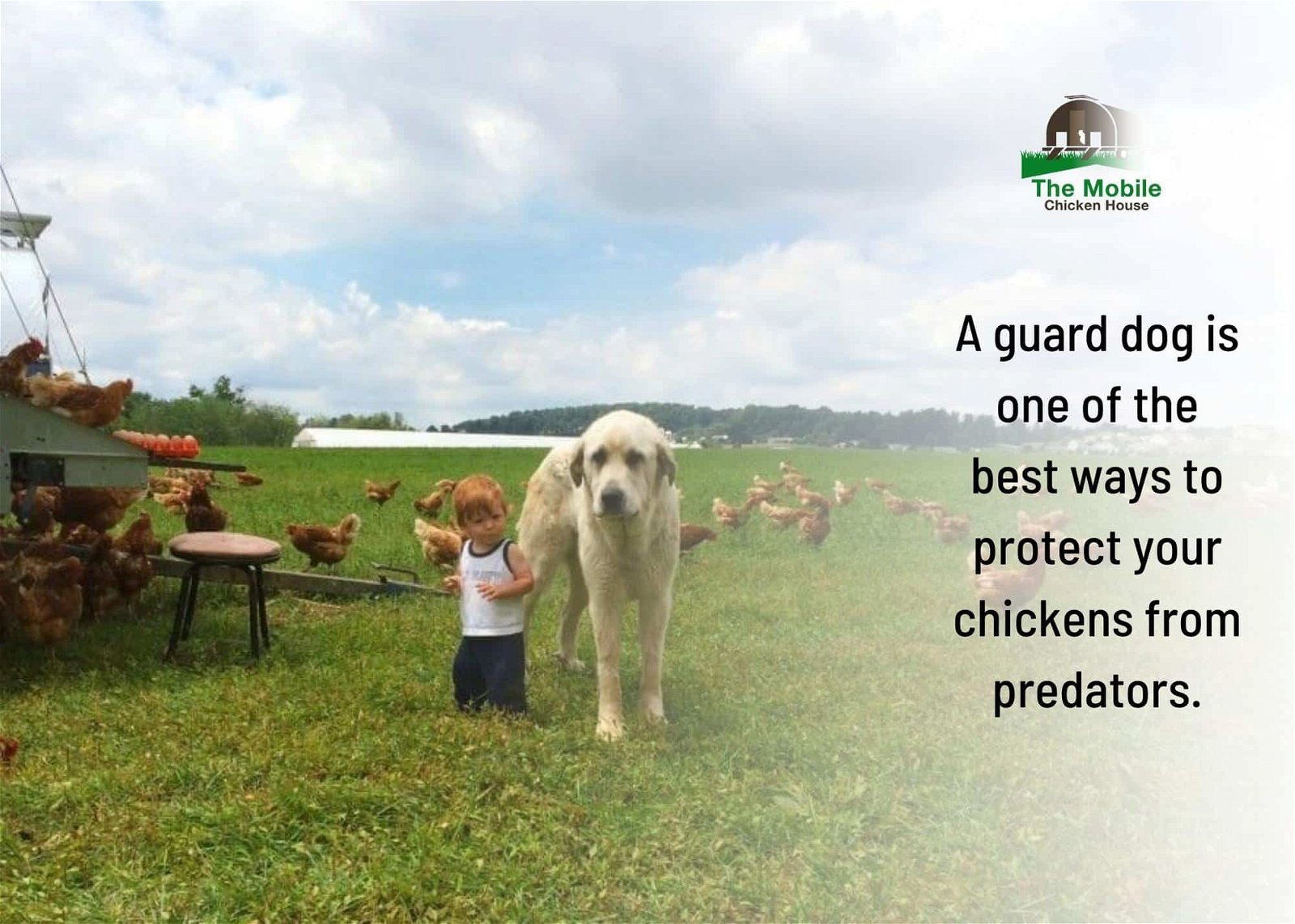
Conclusion
If you would like to run an efficient, productive chicken business, contact us here at the Mobile Chicken House!
We would love to use our mobile chicken coops and our years of personal experience in the chicken business to help you run your business better.
The coops we sell include:
Give us a call today to order your coop! We look forward to hearing from you.
